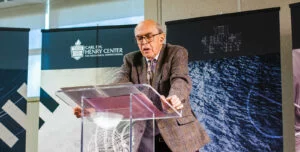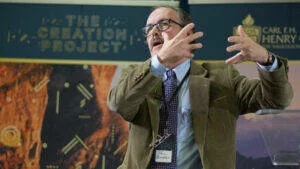Modern readers typically view the Genesis creation narratives through the lens of science.
Does the text confirm or contradict contemporary scientific accounts of the origin of life? If the former, the reader attempts to demonstrate their congruence; if the latter, the reader either rejects the prevailing scientific consensus or rejects the veracity of scripture, at least at a literal, historical level. For Origen (185-254 CE), the famous third-century theologian, philosopher, and biblical exegete, the scientific framing of the question fatally misses the mark. For him, the question is not: does Genesis comport with modern science (or, alternatively, philosophy)? Rather, the question is: what do the creation narratives reveal about the nature of the world and the status of the soul, and how does that knowledge facilitate our spiritual development? In his view, the origin and purpose of the universe are inextricably linked, so the salient question about Genesis is not primarily scientific but, ultimately, theological, specifically soteriological (that is, concerning salvation). Genesis, Origen avers, is a coded text that offers invaluable clues into the deeper meaning of the cosmos if we learn how to decode it through a spiritual interpretation.
Origen’s Hermeneutic: Asking Why God Creates, not How
Only fragments of Origen’s vast literary corpus have survived the ravages of time. Nevertheless, from the extant works, we are able to reconstruct his hermeneutics (that is, his theory of scriptural interpretation) generally and his reading of Genesis 1-3 in particular. Origen’s sixteen extant Homilies on Genesis include his spiritual reading of the creation stories. Unfortunately, Origen’s Commentary on Genesis, written in thirteen books, do not survive, but he treats the creation narratives extensively in On First Principles. See for helpful analysis Martens, “Origen’s Doctrine of Pre-Existence and the Opening Chapters of Genesis,” 516-549. Origen’s guiding hermeneutical principle is to “find a meaning worthy of God”On First Principles 4.2.9 or “worthy of divine majesty”Homilies on Leviticus 7.5. Given the divine authorship of scripture through the Spirit, Origen presupposes: (1) the veracity of scripture and (2) the significance of every detail. Therefore, all apparent contradictions or textual infelicities must have sound theological explanations. Origen differentiates between the literal, moral, and spiritual senses of scripture in Book IV of his major theological book On First Principles. His hermeneutical framework enables the discovery of deeper truths beneath the literal or historical level of scripture, which has direct significance for his reading of the creation narratives, as we will see. In essence, Origen sees himself as a spiritual “code-breaker” of scripture. If we remain at the surface level of the text, we will miss the transformative truths that it conceals.
Origen interprets the two creation narratives in Genesis 1-2 as two separate creations: immaterial/incorporeal and material/corporeal: “And, therefore, that first heaven indeed, which we said is spiritual, is our mind, which is also itself spirit, that is, our spiritual man which sees and perceives God. But that corporeal heaven, which is called the firmament, is our outer man which looks at things in a corporeal way.”Homilies on Genesis 1.2. These two accounts are theologically related, but cosmologically distinct.Origen’s guiding hermeneutical principle is to “find a meaning worthy of God” or “worthy of divine majesty.” In the first creation, God creates disembodied or incorporeal rational minds.Called mens, see Riemer Roukema, The Westminster Handbook to Origen, 201. Eventually, as Origen details in On First Principles 2.8.3, these rational minds “cool” in their love of God, which results in their fall from the blissful pre-existent state of union with God. Their divine defection creates a cosmic crisis, since it opens an expanding void between themselves and God, a negative “space” that threatens to alienate them from God permanently. God creates the material universe—the cosmos—to arrest their spiritual free-fall and to provide a context for their eventual return to God after an extensive process of purification and education: “For Origen, the material universe functions positively as a cosmic net that saves the soul from falling into oblivion. Moreover, it serves as a springboard for the soul’s journey back to God.”Scott, Journey Back to God: Origen on the Problem of Evil, 74.
His theological-cosmological interpretation of Genesis, then, displays the soteriological shape of his hermeneutics. He reads the narrative for clues into meaning behind the cosmos. His interpretation engages soteriological—not scientific—questions: Why did God create the world? Why does it seem unjust? What is the purpose of life in this world? What happens afterwards? From these theological preliminaries he develops a soteriological framework for the soul’s fall (in the pre-existent realm), incarnation in the world (based on the degree of its decline), amelioration (through moral, intellectual, and spiritual renewal), and ultimate salvation (after an extensive process of education and purification in this world and in the afterlife). To fixate on the biological mechanisms by which the cosmos arose would blind us to the underlying point. A patient does not need to know the precise chemical compounds of their medication, or the history of its development, only that they must take it to recover their health. Similarly, as fallen souls who suffer from various moral ailments that impair our spiritual well-being, the crucial question is not how the universe unfolded, but why, and what do we do now that we find ourselves in it?
Origen’s Exegesis: Digging for Treasure in the Text
Origen sees exegesis as an arduous process of uncovering spiritual truths buried beneath the surface narrative. He does not discount the literal, historical details as unimportant. Instead, he sees them as secondary to the deeper meanings only accessible to the spiritual eyes of the exegete. In order to locate these truths, the reader of scripture, in this case, Genesis, must go on a spiritual “treasure hunt” for the gems that God has hidden therein for the industrious interpreter: “Observe each detail which has been written. For, if one knows how to dig into the depth, he will find a treasure in the details, and perhaps also, the precious jewels of the mysteries lie hidden where they are not esteemed.”Homilies on Genesis 8.1. Origen… does not discount the literal, historical details as unimportant. Instead, he sees them as secondary to the deeper meanings only accessible to the spiritual eyes of the exegete.Insights do not come easily, in Origen’s view. It strains the mind and the soul to perceive the mystical truths of scripture, and the reader relies on the Spirit throughout. Reading scripture, then, becomes spiritually transformative: “In short, the exegetical project for Origen was a way of life, a way of salvation, culminating in the vision of God.”Martens, Origen and Scripture, 243. So while Origen would affirm discourse about the literal, historical meaning of Genesis, he would not want us to be detained by it.
In conclusion, how can Origen, an ancient scholar, elucidate Genesis, an ancient text, to a skeptical modern reader who might be unfamiliar with the former and dubious about the latter? First, he reframes the question. Origen’s primary hermeneutical question is not “How does Genesis align with modern science”? but rather “What does Genesis teach us about life in this world?” Shifting away from entrenched debates opens new ground for more fertile discussion. Second, and relatedly, Origen invites us to look deeper into the text for clues about the cosmos and humanity. For instance, rather than asking if Adam and Eve were literal, historical figures, his procedure invites us to utilize the text to analyze the human condition. Humans are created in the image of God, but sin alienates us from God, others, nature, and our very selves. Sin has individual, social, and cosmic consequences. According to Origen, God designs the world as a hospital or schoolroom where we gradually ascend to God through moral, intellectual, and spiritual improvement. Finally, Origen’s complex, multivalent interpretation of Genesis reminds us that the “decoding” of scripture requires our best efforts and promises spiritual transformation. To uncover the spiritual truths embedded in scripture, we have to move beyond superficial analysis, specious dichotomies, and stale debates to more theologically driven, philosophically informed, and spiritually vibrant encounters that make Genesis an asset rather than a liability.
Additional Resources for Further Reading
Origen’s Interpretation of Genesis:
- Bammel, C. P., “Adam in Origen,” in The Making of Orthodoxy: Essays in Honour of Henry Chadwick, ed., R. Williams (Cambridge: Cambridge University Press, 1989), 62-93.
- Blosser, Benjamin P., Become Like the Angels: Origen’s Doctrine of the Soul (Washington, DC: The Catholic University of American Press, 2012).
- Bostock, Gerald, “Origen’s Doctrine of Creation,” Expository Times 5 (2007): 222-227.
- Origen, Homilies on Genesis and Exodus, trans., Ronald E. Heine, The Fathers of the Church 71 (Washington, DC: The Catholic University of America Press, 1981).
- Martens, Peter, “Origen’s Doctrine of Pre-Existence and the Opening Chapters of Genesis,” Zeitschrift für Antikes Christentum 16 (2013): 516-549.
Books about Origen:
- Crouzel, Henri. Origen, tr. A. S. Worrall (T.&T. Clark Ltd. 1989).
- Daniélou, Jean. Origen, tr., Walter Mitchell (New York: Sheed and Ward, 1955).
- Heine, R. E. Origen: Scholarship in Service of the Church (NY: OUP, 2011).
- Martens, P. Origen and Scripture: The Contours of the Exegetical Life (NY: OUP, 2012).
- Scott, Mark S. M. Journey Back to God: Origen on the Problem of Evil (NY: OUP, 2015).
Online Resources:








Comments
Be the first one to make a comment!